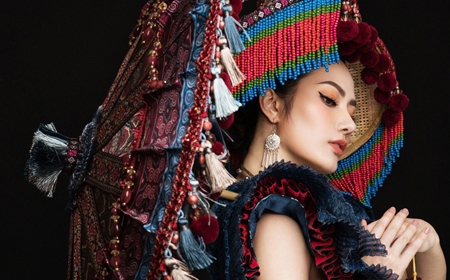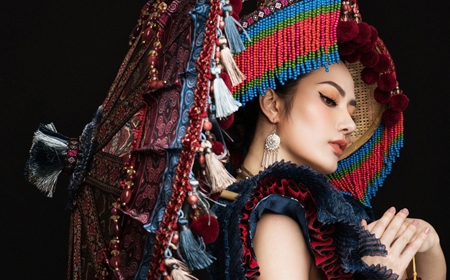
Vietnamese representative Dieu Linh has unveiled the Mong ethnic costume which she will wear for the national costume competition at the Miss Tourism Queen International 2018 pageant in Thailand.

Mong ethnic
costume to be introduced at Miss Tourism Queen Int’l
According the Vietnamese representative, apart from Ao
dai, Vietnam has a rich variety of other colourful outfits to be introduced to
the world, and the traditional clothing of the Mong ethnic group are among
them. For this reason, she selected the outfit, which takes inspiration from
the traditional costumes of the Mong ethnic minority group, for introduction at
the international playground.
The Mong ethnic costume is
designed by Ngo Manh Dong Dong. Brocade is a key material, and it features hand
embroidered designs by Mong ethnic people from Ha Giang Province.
The Mong ethnic costume is
designed to allow Linh to show off her wonderful figure for the pageant.
The shirt is inspired by the
wedding costumes of Mong ethnic people.
The outfit is complimented with a
hand embroidered hat and shoes.
The entire outfit, including
silver necklace and earrings, weighs more than 30kg.
The costume was made over 2
months by 26 artisans.
Dieu Linh modeled the costume for
a photoshoot as the first activity of the Miss Tourism Queen International 2018
pageant on May 9.
Source: NDO
With an increasingly vibrant and widespread emulation movement aimed at building cultured residential areas and cultured families, Yen Thuy District has been making steady progress toward improving both the material and spiritual well-being of its people, while fostering a civilized, prosperous, beautiful, and progressive community.
Once lacking recreational spaces and community facilities, Residential Group 2 in Quynh Lam Ward (Hoa Binh City) has recently received attention for the construction of a new, spacious, and fully equipped cultural house. The project followed the model of state support combined with public contributions in both labor and funding.
The "All people unite to build cultural life" movement, which has been effectively integrated with Kim Boi district’s socio-economic development goals, is fostering a lively spirit of emulation across local residential areas, hamlets, villages, public agencies, and enterprises. In addition, through the initiative, traditional cultural values are being preserved and promoted, while community solidarity and mutual support in poverty reduction and economic development are being strengthened.
A working delegation of the Hoa Binh provincial People’s Committee led by its Permanent Vice Chairman Nguyen Van Toan on June 11 inspected the progress of a project to build the Mo Muong Cultural Heritage Conservation Space linked to tourism services in Hop Phong commune, Cao Phong district.
Born and growing in the heroic land of Muong Dong, Dinh Thi Kieu Dung, a resident in Bo town of Kim Boi district, in her childhood was nurtured by the sweet lullabies of her grandmother and mother. These melodies deeply imprinted on her soul, becoming an inseparable part of her love for her ethnic group's culture. For over 20 years, this love for her hometown has driven Dung to research, collect, and pass down the cultural values of the Muong people to future generations.
In the final days of May, the Ethnic Art Troupe of Hoa Binh Province organized performances to serve the people in remote, mountainous, and particularly disadvantaged areas within the province. These were not just ordinary artistic shows, but they were the meaningful journeys aimed at spreading cultural values, enhancing the spiritual life of the people and contributing to the preservation of ethnic minority cultural identities.



